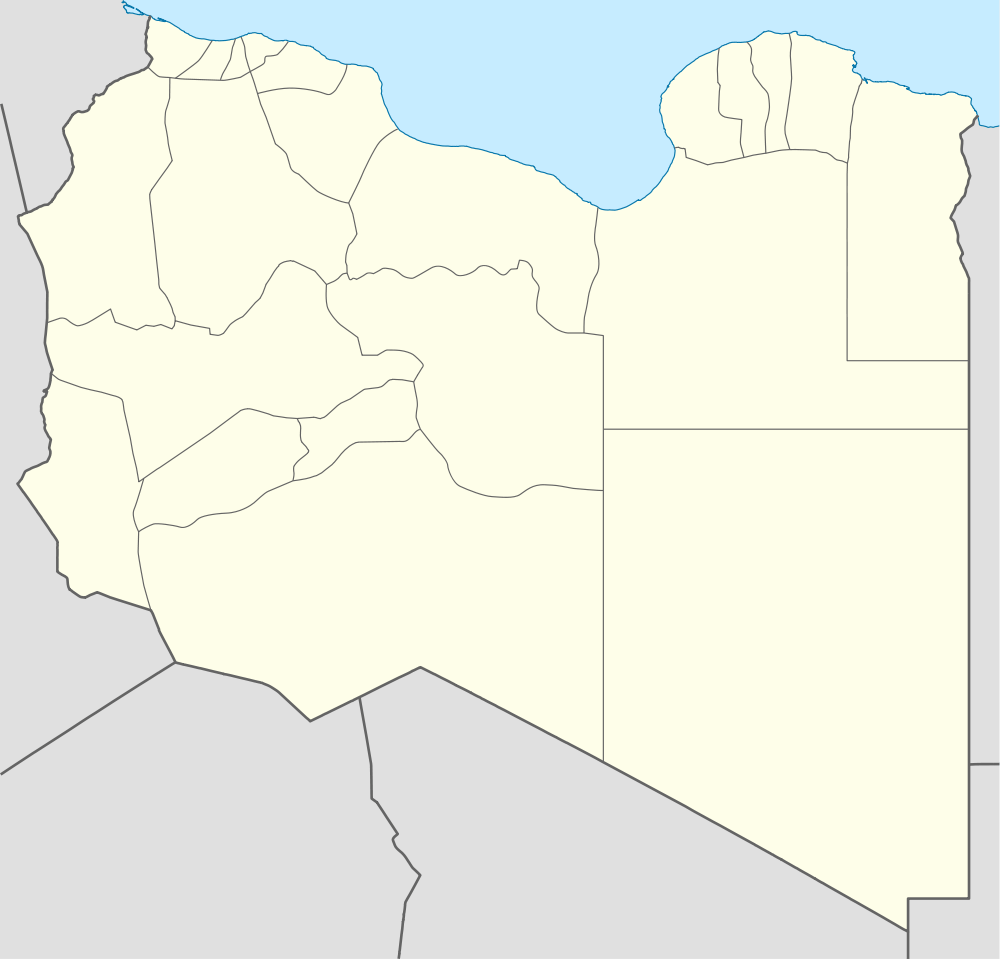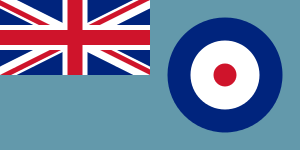Gamal Abdul El Nasser Air Base
Gamal Abdul El Nasser Air Base | |||||||||||||||||||
|---|---|---|---|---|---|---|---|---|---|---|---|---|---|---|---|---|---|---|---|
| IATA: none – ICAO: none | |||||||||||||||||||
| Summary | |||||||||||||||||||
| Airport type | Military | ||||||||||||||||||
| Operator | Government | ||||||||||||||||||
| Location | Libya | ||||||||||||||||||
| Elevation AMSL | 519 ft / 158 m | ||||||||||||||||||
| Coordinates | 31°54′34.22″N 023°54′34.22″E / 31.9095056°N 23.9095056°E | ||||||||||||||||||
| Map | |||||||||||||||||||
 Gamal Abdul El Nasser Air Base Location of Gamal Abdul El Nasser Air Base, Libya | |||||||||||||||||||
| Runways | |||||||||||||||||||
| |||||||||||||||||||
Gamal Abdul El Nasser Air Base is a Libyan Air Force (Arabic: القوات الجوية الليبية, Berber: Adwas Alibyan Ujnna) base, located about 16 km south of Tobruk. It is believed to have once had about 60 or 70 Mirage F.1EDs aircraft assigned.
Prior to 31 March 1970 the airfield was known as Royal Air Force Station El Adem and used by the RAF primarily as a staging-post.[1] Before the Second World War it had been an Italian Air Force airfield, and a number of the former Italian buildings were seen to remain in 2003 during a courtesy visit by former RAF personnel, at which time no military aircraft were in evidence.
Royal Air Force Station El Adem was the fuel stop for the BOAC aircraft carrying the new Queen Elizabeth II on her flight from Entebbe to London on 7 February 1952.[2]
World War II
The airfield was largely reconstructed in 1942 by the Royal Air Force (RAF) and brought into operational use on 12 December 1942. It was used during World War II by the RAF and the United States Army Air Forces during the North African Campaign against Axis forces.
RAF units which used the airfield were: No 31 Air Stores Park (8 Mar - 10 Apr 1941); HQ No 262 Wing (11 - 20 Dec 1941); HQ No 258 Wing (12 - xx Dec 1941, 3 - xx Feb 1942); No. 2 Squadron RAF (19 - 21 Dec 1941, 2 - 3 Feb 1942, 15 - 17 Feb 1942); No 33 Air Stores Park (23 Dec 1941 - 31 Jan 1942); No 53 Repair and Salvage Unit (26 Dec 1941 - Feb 1942); No. 80 Squadron RAF (28 Dec 1941 - 3 Feb 1942); Air Sea Rescue Flt (10 - 31 Jan 1942); No 73 Sqn (3 - 18 Feb 1942, 20 - 27 May 1942, 17 - 28 Nov 1942); No 94 Sqn (15 - 17 Feb 1942); HQ No 211 Group (12 Mar - xxx 1942) No 211 Group Communications Flt (20 Apr 1942 - 17 Sep 1943) No 267 Sqn (Aug 1942 - Jan 1943) HQ No 243 Wing (17 - xx Nov 1942) No 33 Sqn (18 - 28 Nov 1942) 117 Sqn (19 Nov 1942 - 9 Jan 1943) 213 Sqn (20 - 25 Nov 1942) 238 Sqn (20 - 25 Nov 1942) No 12 Staging Post (8 Mar 1943 - 1 Aug 1945) HQ No 7 (SAAF) Wing (17 Apr - 18 May 1943) No 2915 Sqn RAF Regiment (May 1943 - xxx 194x) No 47 Sqn (14 - 25 Nov 1943) HQ No 240 Wing (28 Dec 1943 - 4 Feb 1944) No 178 Sqn (1 Jan - 1 Mar 1944) No 462 Sqn (1 Jan - 15 Feb 1944) No. 336 Sqn (31 Jan - 5 Mar 1944, 15 Jul - 16 Sep 1944) No 1900 AOP Flt (15 Jan - 1 Jul 1952) No 249 Sqn (11 Mar - 3 May 1957) Swifter Trials Flt (Jan - Jul 1960) No 1564 Flt (1 May 1969 - 31 Mar 1970) No 1 Sqn RAF Regiment
USAAF Ninth Air Force units which used the airfield were:
- 316th Troop Carrier Group, 10 December 1942-January 1943, C-47 Skytrain
- 379th Bombardment Squadron, (310th Bombardment Group), 2-26 November 1943, B-25 Mitchell
- Attached to No 235 Wing, Royal Air Force[3]
Current use
Today, the airfield is a Libyan Air Force air base. The RAF World War II configuration is still evident in aerial photography.
A 2011 Google satellite picture shows a number of delta-winged jets resembling the MiG-21 series parked on the main apron at this air base. Judging from the picture it is hard to determine whether these aircraft are operational or not.
References
- ↑ Sir David Lee, 'Wings in the Sun,' Air Historical Branch/HMSO, London, 1989, 157-8.
- ↑ http://www.dailymail.co.uk/femail/article-2097057/To-Her-Majesty-thoughts-prayers-Mummie-The-message-Queen-Mother-sent-daughter-flew-home-Queen.html
- ↑
 This article incorporates public domain material from websites or documents of the Air Force Historical Research Agency.
This article incorporates public domain material from websites or documents of the Air Force Historical Research Agency.
- Maurer, Maurer. Air Force Combat Units of World War II. Maxwell AFB, Alabama: Office of Air Force History, 1983. ISBN 0-89201-092-4.
- Maurer, Maurer, ed. (1982) [1969]. Combat Squadrons of the Air Force, World War II (PDF) (reprint ed.). Washington, DC: Office of Air Force History. ISBN 0-405-12194-6. LCCN 70605402. OCLC 72556.5
External links
| ||||||||||||||||||||||||||||||||||||||||||||||

.svg.png)